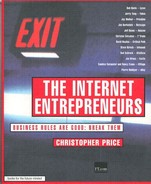iVillage's working culture
The notion of co-chairperson, joint chief executives, or however two founders split their roles, is a difficult one for most observers to contemplate, and iVillage is no different. After all, decisions have to be arrived at, rules have to be enforced and resolutions have to be made. Carpenter talks about trees, although the analogy escapes me. I think she is the root and branches to Evans's leaves. 'Nancy has an amazing sense of richness and detail and how to really bring something alive for the consumer,' she explains. 'I take the role of business architect.' Evans adds, 'We made a decision early on that we would not be in the same room at the same time unless we chose to because we wanted to divide and conquer and get going faster. We've changed our roles at different junctures depending on what was needed.'
Carpenter explains further:
'We probably haven't discussed this in more than a year because it's something we find so natural. It's more about trying to explain to other people what we find intuitively.
'I guess I work more in the abstract and Nancy makes it real. I actually think there are a lot of other ways of dividing up labor than in traditional hierachical companies where the size of your turf is equal to your value. That's just not true. The value of your contribution is equal to the value of the person.
'One of the most valuable people we have in the company has no one reporting to him. What we believe as a company is that you should find the thing that you are a 10 or 11 at and do that thing 24 hours a day.
'The point is to optimize who you are. Which actually tends to be a lot of fun because normally your job involves you utilizing a lot of strengths and your weaknesses so that you have to tend to drag yourself through the day.
'I think there are a lot of management issues that working for an internet company will change. People here tend to divide their jobs, which actually empowers them and helps them grow in their work. It has been a fascinating experience to go through, both culturally and organizationally.'
Evans agrees: 'It's important to underline that we would not have moved as fast as we did, or as we had to, if we hadn't been operating as dramatically a different structure as we did, as opposed to a traditional corporate culture.'
Was this an internet thing, or a female thing?
Carpenter, the more agitated and energetic of the two women, wrestles with the answer: 'I don't know because I'm part of both. In big companies, there's no choice in the way you work. Maybe it's a little bit of both - the people who have the biggest difficulty adjusting to our way of working are from bigger companies and are often male.'
This alternative management philosophy has permeated the development of the iVillage site. Evans gives an example:
'When we first launched Parent Soup, it was arranged by subject.
More than seven million women now visit iVillage every month
'The structure for our home pages now is dramatically different: the door you choose to enter Parent Soup, for example, depends on the age of your child. This is a totally different way of getting to that issue than by subject.
'And that came from the feedback we got from users, rather than editors sitting in a room, coming up with ideas and assigning them.
'Thus the role of editor on our sites is not a conventional one - it's a listening one, listening to what the women are talking about in our chat rooms and on our message boards. That is pure market research and led us to where we are today.
'For example, when we saw that there were literally tens of thousands of women coming in to talk about fertility issues, we created an area just for them where their issues could be addressed.'
Evans points to another distinguishing feature of their sites:
'When women talk about things, they will talk about everything. They are global talkers. So that became iVillage - a place where women could go to to talk about their lives. Today, we have 17 sites on the things they care about. Women come to get things done, to get an answer to something. That's a real gender difference. Men want to surf, whereas women will bookmark three or four sites and keep coming back to them. That behavior has really been to our advantage.'
The result has been that more than seven million women now visit iVillage every month and the site ranks fourth for the length of time visitors spend there. Of those millions of visitors, one million are from outside the US. The potential for international expansion has not been lost on the two founders. Talks are already under way with partners in several overseas markets with a view to expanding the iVillage concept: 'iVillage as a model in helping women to solve things and get things done we think is something that will translate really well,' says Carpenter, adding that the notion of tailoring the content in response to what women want locally is another exportable winner.
Evans agrees: 'It's self-defining. Take the fertility example. We weren't doing that much on it, and our visitors came in, set up camp and we supported them. For that reason I think iVillage will travel as well to the UK as to Japan because the issues can be very different but the women will tell us what they are.'
Relationships with local service providers, or content creators, may be struck, but the sites will be branded iVillage. 'iVillage has a wonderful resonance in almost every culture,' says Carpenter. She adds, in her inimitable abstract way, 'In Japan, they're losing their towns and villages, so it's particularly resonant there.'
